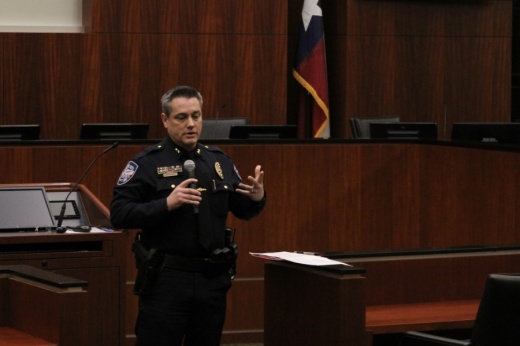Many citizens who spoke during the previous town hall were concerned about police discipline, and Fortune explained Jan. 21 that the Keller Police Department is in the process of creating a new discipline matrix to determine the best way to respond to future misconduct.
Fortune described a discipline matrix as a method of categorizing different levels of misconduct and assigning discipline based on how severe the misconduct is. It also accounts for circumstantial factors that could increase or decrease what level of discipline is called for.
“It usually doesn't go into as specific as 'For X, then you get Y,'” he said in a previous interview. “It usually is like, 'For X, you'll get Y through Z.' So it gives you curb lines based on the individual circumstances.”
Fortune sought and received examples of discipline matrices from more than 15 police and sheriff’s departments, some as far away as New York City as well as from other North Texas cities. Department supervisors are currently reviewing the matrices Keller received and will make recommendations to Fortune on how to incorporate some of those standards. Changes to police discipline standards will be presented to the Chief’s Advisory Council and the public before they are adopted.
The Chief’s Advisory Council was started in 2019 by Pastor Kason Branch and previous police Chief Michael Wilson as a way to involve Keller citizens in police decision-making. Fortune said the police department and City Council are working to codify what will happen when the first term of the advisory council ends in August 2021 and how to integrate new members.
The town hall was also an opportunity for Keller residents to voice questions, concerns and suggestions. Unlike the Jan. 11 town hall or the City Council meeting where Fortune first addressed the August incident, most of the feedback residents provided in person or online focused on police department policy, rather than the misconduct that inspired the changes. Fortune continued to make clear that he cannot speak publicly about the incident until the lawsuit is over but still offered to speak with concerned residents once he can.
The lawsuit was filed by Marco Puente against Blake Shimanek and Ankit Tomer, two Keller police officers who arrested Puente while he filmed the arrest of his son for a traffic violation. Puente was released from jail the same day, Aug. 15, and all charges against him were dropped. Fortune opened an internal investigation into the incident in August and found that Shimanek’s actions warranted demotion based on department policy.
Puente’s lawyers filed a federal lawsuit Dec. 14 alleging the officers involved violated his constitutional rights. Keller City Council was briefed about the lawsuit Dec. 23, and Mayor Armin Mizani released footage of the incident, along with a statement.
What happened in August spawned the changes happening within the department, which Fortune outlined during both town halls. Many of the department's goals deal with transparency, accountability, and reframing the relationship between Keller police and citizens.
Department goals include:
- quarterly reports to Keller City Council, rather than annually;
- frequent supervisor review of bodycam and dashcam footage;
- multiple supervisors approving arrests for low-level traffic violations; and
- a Keller High School student forum to educate young drivers.
“Officers are given a tremendous amount of authority, power, latitude,” he said. “Just because the law says you’re able to do this, is it right to do this? That’s on the department to instill the culture and the training in each of their officers about what the expectations are.”





